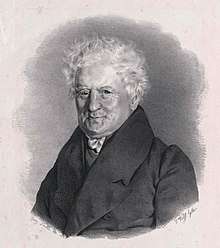Wenzel Müller
Wenzel Müller (26 September 1767 – 3 August 1835) was an Austrian composer and conductor. He is regarded as the most prolific opera composer of all time with his 166 operas.[1]

Life and career
Müller was born in Markt Türnau, in Moravia.[2] He studied with Carl Ditters von Dittersdorf and performed as a theatre musician in his youth. In 1786 he became Kapellmeister at the Theater in der Leopoldstadt in Leopoldstadt, Vienna. After several years at the German theatre in Prague from 1807 until 1813, he returned to Leopoldstadt, where he worked until 1830. Under his leadership, the theatre became one of the most important venues in Viennese musical life. He died in Baden bei Wien.
He was a popular and prolific composer, producing more than 250 works. Although he wrote several popular stage works (mostly Singspiele), his art songs are his enduring legacy. Often possessing witty music and lyrics or expressing a great deal of tenderness, Müller's songs were immensely popular and some of the works he wrote with Ferdinand Raimund remain in the Viennese repertory.
His opera Die Schwestern von Prag provided the theme for Beethoven's "Kakadu Variations" for piano trio, Opus 121a. He is said to have composed what has been falsely known as Mozart's Twelfth Mass, K. Anh. 232, the Missa in G major K. Anh. 232 (C1.04).[3]
Müller was married twice, and his second wife was Magdalena Valley Reining. He had children named Therese (1791–1876), Caroline (1814–1868), Ottilia (1816–1817), Carl (born 1815) and Joseph (born 1816), all of whom became opera singers.[4]
Stage works
| Title | Genre | Subdivisions | Libretto | Première date | Place, theatre |
|---|---|---|---|---|---|
| Harlekin auf dem Parade Beth oder Nach dem Schlimmen folgt das Gute | große Pantomime | Anton Baumann | 1784; 14 May 1790 | Brno; Vienna, Theater in der Leopoldstadt | |
| Das Sonnenfest der Braminen | heroisch-komisches Singspiel | 2 acts | Karl Friedrich Hensler | 9 September 1790 | Vienna, Theater in der Leopoldstadt |
| Kaspar der Fagottist oder Die Zauberzither | Singspiel | 3 acts | Joachim Perinet | 8 June 1791 | Vienna, Theater in der Leopoldstadt |
| Das neue Sonntagskind | Singspiel | 2 acts | Joachim Perinet, after Philipp Hafner | 10 October 1793 | Vienna, Theater in der Leopoldstadt |
| Die Schwestern von Prag | Singspiel | 2 acts | Joachim Perinet, after Philipp Hafner | 11 March 1794 | Vienna, Theater in der Leopoldstadt |
| Das lustige Beylager | Singspiel | 2 acts | Joachim Perinet, after Philipp Hafner | 14 February 1797 | Vienna, Theater in der Leopoldstadt |
| Die Teufels Mühle am Wienerberg | Schauspiel mit Gesang | 4 acts | Carl Friedrich Hensler/Leopold Huber | 12 November 1799 | Vienna, Theater in der Leopoldstadt |
| Die Belagerung von Ypsilon oder Evakathel und Schnudi | Karikaturoperette | 2 acts | Joachim Perinet, after Philipp Hafner | 4 May 1804 | Vienna, Theater in der Leopoldstadt |
| Javima | Oper | 3 acts | 21 May 1807 Prague | Vienna, Theater in der Leopoldstadt | |
| Samson | Melodram | 3 acts | Joseph Anton Schuster | 1808 | Vienna, Theater in der Leopoldstadt |
| Simon Plattkopf, der Unsichtbare | Singspiel | 1 act | Karl Ludwig Costenoble | 1809 | Vienna, Theater in der Leopoldstadt |
| Die Wunderlampe | Zauberoper | 4 acts | Josef Alois Gleich | 1810 | Prague |
| Der Fiaker al Marquis | komische Oper | 3 acts | Adolf Bäuerle | 10 February 1816 | Vienna, Theater in der Leopoldstadt |
| Aline oder Wien in einem andern Welttheil | Zauberoper | 3 acts | Adolf Bäuerle | 9 October 1822 | Vienna, Theater in der Leopoldstadt |
| Der Barometermacher auf der Zauberinsel | Zauberposse | 2 acts | Ferdinand Raimund | 18 December 1823 | Vienna, Theater in der Leopoldstadt |
| Der schwarze See oder Der Blasebalgmacher und der Geist | Zauberspiel | 2 acts | Lenz? | 4 February 1825 | Vienna, Theater in der Leopoldstadt |
| Herr Josef und Frau Baberl | Posse | 3 acts | Gleich | 11 May 1826 | Vienna, Theater in der Leopoldstadt |
| Die gefesselte Phantasie | Zauberspiel | 2 acts | Ferdinand Raimund | 8 January 1828 | Vienna, Theater in der Leopoldstadt |
| Der Alpenkönig und der Menschenfeind | romantisch-komisches Zauberspiel | 2 acts | Ferdinand Raimund | 17 October 1828 | Vienna, Theater in der Leopoldstadt |
References
- Towers, John. "Who composed the greatest number of operas?" The Musical Times, 1 August 1911, p. 527 (subscription required)
- "Český hudební slovník". Ceskyhudebnislovnik.cz. Retrieved 19 May 2018.
- Leeson, Daniel N. (2004). Opus Ultimum: The Story of the Mozart Requiem. pp. 99–100.
- "Grünbaum, Therese". Retrieved 29 February 2012.
Sources
- Peter Branscombe. "Müller, Wenzel." (subscription required) The New Grove Dictionary of Opera, edited by Stanley Sadie (1992), ISBN 0-333-73432-7 and ISBN 1-56159-228-5
External links
- Short biography at aieou (in German)
- Selected works
- Free scores by Wenzel Müller in the Choral Public Domain Library (ChoralWiki)
- Free scores by Wenzel Müller at the International Music Score Library Project (IMSLP)
- The Mutopia Project has compositions by Wenzel Müller
- . New International Encyclopedia. 1905.